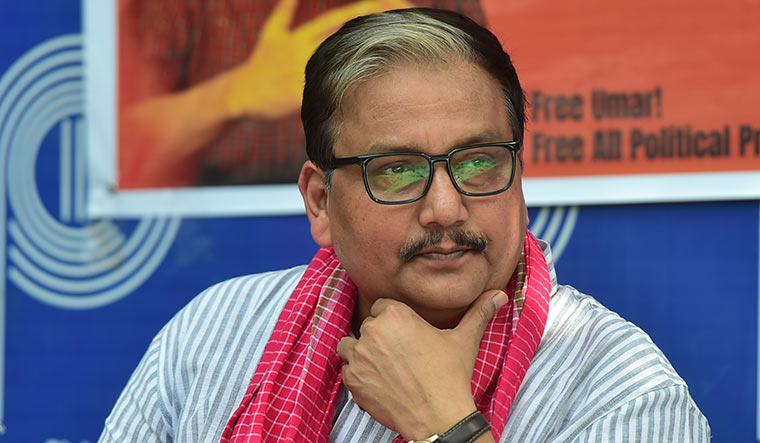RJD leader Manoj Jha says the caste survey in Bihar will form the basis of future affirmative action in the state. In an exclusive interview with THE WEEK, he says if the opposition alliance wins the election, it will replicate the exercise nationally. In his view, the ongoing debate around merit in the country is farcical. Excerpts:
Why do we need a caste census?
The last caste census was carried out in 1931. After that, partition happened, but the data was not revised. We had the first backward castes commission― the Kaka Kalelkar Commission―in 1953, which after doing a lot of work, discarded its own report. Then came the Mandal Commission, which after a lot of anthropological work and extrapolation of data from 1931, derived a figure of 52 per cent OBCs and recommended a reservation of 27 per cent for them. The backward caste communities feel they need representation based on contemporary data.
Will caste census be the main election plank for the opposition?
If we win the election, we will do it. If we don’t, we will still stick to it. So this is not an electoral issue for us. It is about commitment to constitutional values, to the subalterns. Beyond political representation, has there been a change in institutional representation? No. Look at the judiciary or the bureaucracy.
A caste survey has been conducted in Bihar.
When the Centre declined to undertake a caste census, Bihar conducted its own survey. But the Union government tried to block it. In the Supreme Court, Mukul Rohatgi argued against the census. Till then, I gave them the benefit of doubt. But then, Tushar Mehta (solicitor general of India) argued in the court. That certainly must have been on the PMO’s directions. They tried to mislead the court by stating in an affidavit on August 28 that the state government could not carry out a census. Later, on the same day, they filed a second affidavit to say this paragraph had crept in inadvertently. It worries me that we have a government which can think of blocking the fate of 70 per cent or more of our population.
What next in Bihar after the survey?
The Bihar government is very serious about the exercise. This data will become the base for all future policies and affirmative action in Bihar.
Would there be a change in the reservation format in Bihar?
The data has to translate into doables. One is reservation. Also, we will request the Union government that when it is selling off public sector [undertakings] and as employment is going down, we must have a conversation with the private sector, that our diversity should get reflected in their recruitment.
So reservation should extend to the private sector?
Private sector is a misnomer. It is not that private. They take loans from public sector banks, land from the government and get tax holidays. With all these, it cannot be called private sector.
The Centre says caste census involves technical difficulties.
If the Union government says this, it cannot run this country. Its wisdom index is zero. You just have to add a column in the census form. It does not have any bearing on the manpower or the resources. All I can say to them is, ‘Get well soon!’
There are differences within the opposition alliance on caste census. The Trinamool Congress has reservations.
Mamata ji is a seasoned leader. She has certain issues with caste census. But the overwhelming majority within the alliance is in favour of caste census. I am very sure that looking at the larger picture, Mamata ji would understand.
How do you view the slogan ‘Jitni Abadi Utna Haq (proportionate reservation)’?
This has roots in Lohia. Rahul ji has repeated it in a different way. Lohia ji’s idea was that you must look at the size of the population and then avenues of inclusivity and development should be decided accordingly.
What about the argument on merit?
We have allowed a farcical debate around merit. My own experience says that merit is the biggest myth. Merit is about resources, your family background and the opportunities you get. If somebody believes that 70 years of reservation is enough, let me quote what Mohan Bhagwat said recently, socially transformative experiences take time.
Is there any fear of a backlash?
When there is a tectonic shift in the approved and acceptable paradigm, there is an impact. But when inertia is broken and one equilibrium is lost, a higher equilibrium is achieved.
Was the renewed thrust for caste census prompted by EWS (economically weaker section) quota?
The demand was always simmering. Before the census in 2011, Lalu (Prasad) ji, Mulayam (Singh Yadav) ji, Sharad Yadav ji and even Gopinath Munde from the BJP had raised this issue. If the 50 per cent mark was a Lakshman rekha (a rule that should not be broken), it was breached by the EWS quota, so why not have scientific data and accord affirmative action as per the share in the population?
How do you look at the Rohini Commission for sub-categorisation of OBCs?
It is a mindless exercise. How can you categorise when you do not have the data? I see the Rohini Commission going the Kaka Kalelkar way. The Commission was formed simply to break the consolidation of the OBCs. It is such a bad idea.


